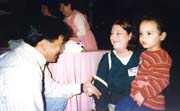“Austie’s hurt,” said Austin Rosado, 3, of Union City, pointing to a photo of himself in an incubator hooked up to some tubes. The picture had been taken while in Englewood Hospital and Medical Center’s Neonatal Intensive Care Unit during Austin’s first two months of life.
“No you’re not,” said his mother Kellie Rosado, patiently. “Your just special.”
Austin was only two pounds, two ounces when he was born three months early.
“You could hold him in the palm of your hand,” said Rosado about Austin’s early delivery. “He thought he was missing a party and wanted to come early.”
Since Austin was born during Rosado’s sixth month of pregnancy, his lungs were not fully developed; he had a bleeding vein inside his brain that healed itself, and he received numerous blood transfusions because he was too young to produce his own blood.
“They always called him the miracle baby,” said Rosado, who was able to show off her son’s good health at the Neonatal Intensive Care Unit (NICU) Reunion held on Sept. 17 to celebrate the unit’s fifth year. Austin featured that day as one of the unit’s proud accomplishments.
Preparing for a miracle
The toddlers who were chasing after Batman and getting their face painted at the NICU Reunion were once fighting for their lives.
Many of the infants treated at the NICU are born premature, with respiratory problems or even surgical problems.
“We treat infants with problems directly from the delivery room,” said Doctor Elizabeth Carlin, one of the co-directors of the NICU.
Many parents who have complications during pregnancy are better prepared when their newborn enters the NICU.
“We spend a lot of time talking to families and making sure that they understand exactly what is going on,” said Carlin.
Doctor Joseph Cison, co-director of the unit, added, “A lot of parents seem to think that they are just going to deliver a baby and it is smooth sailing after that. Unfortunately it is not always a story-book ending.”
However, Rosado, who had to have her uterus sewn shut twice within the two weeks before Austin was born, was able to prepare, at least a little, for what was ahead.
“Something inside said that he was going to be fine,” said Rosado. “It was hard, but I just knew it.” Rosado was involved with Austin’s recovery from the beginning.
“I was there every day at 9 a.m. and left 6 p.m.,” remembered Rosado.
“We are a very strong component of having the families as involved as much as possible,” explained Zahada Cohen, the director of the NICU. “There is no limit to the time they can spend here.”
“What makes it challenging with newborns is that the parents are very involved with the minute-to-minute care,” said Carlin.
Cison adds, “There is a lot of pressure and guilt on the parents. We set support from day one until they go home.”
“At first, I was just allowed to touch him in the incubator,” said Rosado. “But I got to hold him when he was two months old.”
Rosado added that this was the first time she had held her son.
Austin was finally released from the hospital two and a half months later at almost five pounds.
Something to celebrate
When Austin was born, the doctors said that he had a 90 percent chance to live and that if he did, he would be disabled. Not only is Austin alive and capable, he is also bilingual.
Austin learned to speak Spanish from his babysitter.
“He is very smart,” said Rosado. “Some of the stuff that he comes out with is amazing. I am learning from him,” added Rosado, who does not speak Spanish herself.
On a sugar rush from the chocolate donut with sprinkles that he had for breakfast before coming to meet with The Reporter, Austin was full of energy while he helped his mother flip through the pages of his baby book. “I was happy to show everybody [at the NICU] what he looks like now,” said Rosado. “It is very gratifying for us to see the kids come back and hear the parents talk about the support they received.”
“I can’t even describe it,” said Cison. “It was like the feeling of a parent even though the children are not yours.” Many families were interested in not just seeing the doctors who treated their children, but also the other families that were in the hospital at the same time they were.
“You are there for so long, you get to know everybody,” said Rosado. “It would have been nice to see everyone that was there when I was there.”
Now Austin’s biggest health problem is that he often gets bronchitis.
“Anytime the weather changes he gets real sick,” said Rosado, explaining that since he was born so early his lungs didn’t get a chance to develop fully.
Austin also has a speech problem and will begin seeing a speech pathologist.
